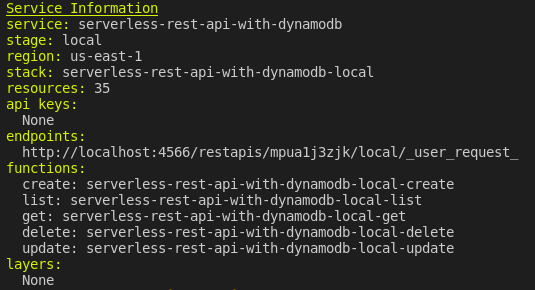This example shows how to use LocalStack to create a basic REST API using the Serverless Framework.
Please make sure to install the following tools on your machine before moving on.
- docker
- docker-compose (version 1.9.0+)
- npm
LocalStack is a cloud application development tool that provides an easy-to-use test/mock system. It creates a testing environment on your local computer that emulates the AWS cloud environment in terms of functionality and APIs.
The Serverless Framework is an open source project that provides infrastructure for developing, compiling, and packaging serverless code for cloud deployment. Serverless deployment refers to an application that makes use of a variety of hosted cloud services, such as AWS Lambda, DynamoDB, and others, rather than long-lived server applications that you control and operate.
Get it up and running the LocalStack with the following command.
$ docker-compose up
localstack-test | LocalStack version: 0.13.0
localstack-test | LocalStack build date: 2021-11-23
localstack-test | LocalStack build git hash: b6046487
localstack-test |
localstack-test | 2021-11-24 07:38:12,906 INFO success: infra entered RUNNING state, process has stayed up for > than 1 seconds (startsecs)
localstack-test | Starting edge router (https port 4566)...
localstack-test | Ready.As there are no errors, LocalStack services are ready for usage.
Install Serverless Framework with the following command.
$ npm install -g serverless
$ npm install --save-dev serverless-localstack
We are going to look at an example Serverless service that serves as the backend for a simple Customer Service app.
I am going to create a simple backend that creates, deletes, lists, updates, and retrieves customers that can be used through a REST HTTP API using API Gateway, Lambda, and DynamoDB services.
The figure below provides an overview of the structure of the repository.
The code example below provides an overview of the getCustomer.py file.
import os
import json
import boto3
if 'LOCALSTACK_HOSTNAME' in os.environ:
dynamodb_endpoint = 'http://%s:4566'% os.environ['LOCALSTACK_HOSTNAME']
dynamodb = boto3.resource('dynamodb',endpoint_url=dynamodb_endpoint)
else:
dynamodb = boto3.resource('dynamodb')
def getCustomer(event, context):
table = dynamodb.Table(os.environ['DYNAMODB_TABLE'])
# fetch Customer from the database
result = table.get_item(
Key={
'id': event['pathParameters']['id']
}
)
# create a response
response = {
"statusCode": 200,
"body": json.dumps(result['Item'])
}
return responseThe serverless.yml file for the service is provided below. This file specifies the functions, endpoints, tables, and permissions that must be provided by the service.
service: serverless-rest-api-with-dynamodb
frameworkVersion: ">=1.1.0 <=2.70.0"
provider:
name: aws
runtime: python3.8
environment:
DYNAMODB_TABLE: ${self:service}-${opt:stage, self:provider.stage}
...
functions:
create:
handler: customers/createCustomer.createCustomer
events:
- http:
path: customers
method: post
cors: true
...
resources:
Resources:
CustomersDynamoDbTable:
Type: 'AWS::DynamoDB::Table'
DeletionPolicy: Retain
...
After these steps are complete, the following command is going to deploy my application to LocalStack.
$ serverless deploy --stage localThe result should be similar to:
The following commands allow you to create, retrieve, update, and delete customers:
$ curl -X POST http://localhost:4566/restapis/mpua1j3zjk/local/_user_request_/customers --data '{"firstName":"Cem","lastName":"ALTUNER"}'
The expected output :
{"id": "481afda4-5735-11ec-95a5-11b91c95714f", "firstName": "Cem", "lastName": "ALTUNER", "createdAt": "1638864689.6023037", "updatedAt": "1638864689.6023037"}
$ curl -X GET http://localhost:4566/restapis/mpua1j3zjk/local/_user_request_/customers/481afda4-5735-11ec-95a5-11b91c95714f
The expected output :
{"firstName": "Cem", "lastName": "ALTUNER", "createdAt": "1638864689.6023037", "id": "481afda4-5735-11ec-95a5-11b91c95714f", "updatedAt": "1638864689.6023037"}
$ curl -X PUT http://localhost:4566/restapis/mpua1j3zjk/local/_user_request_/customers/481afda4-5735-11ec-95a5-11b91c95714f --data '{"firstName":"Can","lastName":"Sanli"}'
The expected output :
{"createdAt": "1638864689.6023037", "firstName": "Can", "lastName": "Sanli", "id": "481afda4-5735-11ec-95a5-11b91c95714f", "updatedAt": "1638864948.3040314"}
$ curl -X GET http://localhost:4566/restapis/mpua1j3zjk/local/_user_request_/customers
The expected output :
[{"firstName": "Cem", "lastName": "ALTUNER", "createdAt": "1638865007.5402353", "id": "05994b8f-5736-11ec-ab31-11b91c95714f", "updatedAt": "1638865007.5402353"}, {"createdAt": "1638864689.6023037", "firstName": "Can", "lastName": "Sanli", "id": "481afda4-5735-11ec-95a5-11b91c95714f", "updatedAt": "1638864948.3040314"}]
$ curl -X DELETE http://localhost:4566/restapis/mpua1j3zjk/local/_user_request_/customers/481afda4-5735-11ec-95a5-11b91c95714f
No output for this operation.


